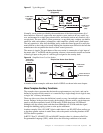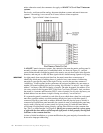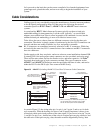
Chapter 5 - Design of Matrix Intercom Systems 63
As received “out of the box,” a matrix intercom system needs to be configured
(programmed). This can include how many users are connected, how many conferences
are expected, what you wish to name the users, who can talk to whom, and, just as
importantly, who cannot talk to whom. In some cases, the default configuration upon first
operation is adequate and may allow enough communications to meet your needs, but it is
unlikely, and frankly, a tremendous waste of capabilities. We will discuss configuration
via software in more detail later.
In this chapter, we will first touch on the design and requirements aspects of the matrix
intercom system, then move into installation, and finally operation. On the CD, we have
included a full, up-to-date (as of this writing) AZ™-EDIT configuration software package
which can be installed and ran on your PC. You do not need to have an intercom system
connected to run the software.
Note
You may not be able to see and/or use some features because they require that an actual
intercom system be connected to your PC.
Loading and running the supplied software will add a good amount of “hands on” to your
experience, but in the interest of keeping this book a useful reference, regardless of what
intercom matrix system you may be exposed to, the examples given will not be specific to
the included RTS™ AZ™-EDIT configuration software except where absolutely
necessary.
To Begin
The first question you should ask, as with all systems design is, “What are you trying to
accomplish?” The matrix intercom needed by a small station in Botswana (to avoid
offending any US residents of small states who are no doubt tired of being referred to as
being suitable for simple, basic, limited products) is considerably different from that
required by MegaMedia Corporate Conglomerate Entertainment Enterprises Ltd. with 87
stations, 4 film studios, and a theme park, located on 3 different continents, all engaging in
joint productions.
I find that system design is best started from the bottom up, rather than the top down. On
that note, figuring the requirements for communications to determine the size of matrix
needed and then later deal with informed compromises to meet size or budget
requirements.
I will also proceed on the basis that any needs for non-matrix portions of the system will
be covered in detail elsewhere in the book, and that we need only concern ourselves with
how to interface to them from the matrix.
In this section I use a lot of examples which are television based, owing to my background
in television, and the origins of modern matrix intercoms, which have been predominantly
TV station driven. The questions and procedures are, however, relevant for all
applications, regardless of industry.
Let’s get started.
How many individual locations and/or persons need to communicate with one another?
Write them down. Organize them by logical grouping or location such as:
Studio A
Floor
Lighting Director
Camera 1


















